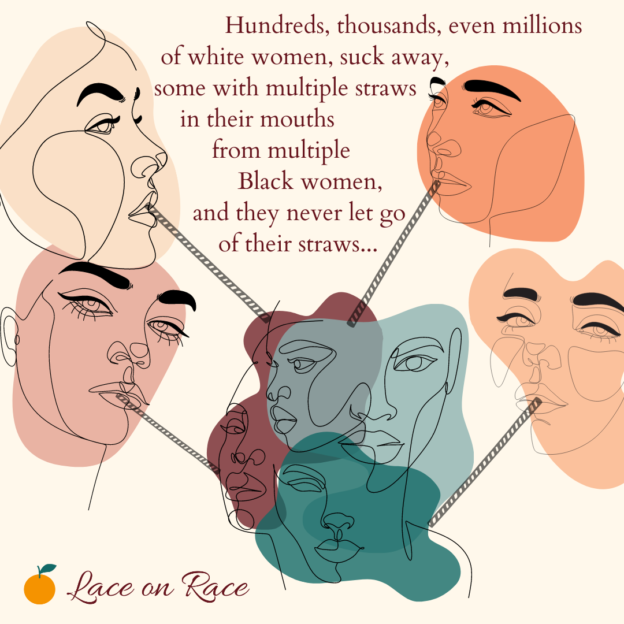From Marlise:
I found an old conversation between Lace and me, and there are ample connections to our recent discussions on self care, forced scarcity, holding others, and the droplets we give out. I am adding connecting commentary throughout but the conversation itself stands on its own. As a note, the conversation does hold spiritual undertones, but I think is still applicable to everyone no matter their stance or beliefs. -Marlise
Lace:
a visual that just came to me is that of our udders being hooked up and then branching off into straws where hundreds, thousands, even millions of white women, suck away, some with multiple straws in their mouths from multiple black women, and they never let go of their straws, but they allow others to graft on to their straws and call the milk their own, and charge for it. meanwhile, the black women are depleted, and only stop producing when they are completely dry and become the dust on which the white women stand.
yowza.
another image: the dissociation in response to the distortion is not necessarily an inevitability. a visual of breathing back life into the Giver, directly from the teat, or through all those tangled straws brings back an idea of a measure of reciprocity. Even when the Giver delivers more than she receives, multiple people breathing back into the straw is sustaining.
Note: This image depicts forced scarcity as a model of white supremacy in contrast to a communal breathing. How are we holding those we think need no holding?
Marlise:
When each person was designed to find a bit of water to pour into another’s hand but instead greedily slurps on the assumption that thirst is coming, only enforced by the simple fact that said individual made another go thirsty. Self preservation from fear not from actual reality. The well of the spirit is unending. The waters can be passed from one hand to the next. Unless, someone gets fearful the handfuls will stop.
Lace:
fear of scarcity brought upon by the depletion of the person on whom you are drawing, which makes for the clench. you are afraid of their death to dust, and you worry about your impending loss, but not enough to breathe back.
this is stunning.
This is the part that must be said, but also must be divorced from explicit Christianity: When one turns away from the Unending Well, and relies on the temporal, and particularly on the temporal marginalized *which you have had a hand in depleting* that will not go well. Not for you. Not for the Other. We are making for deserts; for famine.
Note: “Afraid of their death to dust.” White people have made BIPOC not human, as something to consume. We simultaneously aim to destroy and kill, while using BIPOC as our life source. With white supremacy, there can be no end but death.
Marlise:
My question for myself, what is the well I can draw upon to refill my bucket that isn’t taking another’s last sip?
While, in theory, I should be able to draw upon my husband or friends, it is almost irresponsible to do so just because I SHOULD be able to, especially if their bucket is getting empty.
Lace:
again, an image: loaves and fishes. From a secular standpoint, yes, it is impossible. From the standpoint of our God breathing life and abundance from the most meager of resources, it becomes possible.
A prototype on what I might write on your page: yes, we have the right to ask for a droplet of last drops from those who say they love us. What we breathe back into them can be seen as mist, not visible drops, but what collects on dashboards and bathroom mirrors. Collected over time, what we give our friends are indeed drops.
Note: we need to be aware of the mist we breathe back. That breath that has been aerosolized comes from the depths of our being. It will carry with it any pathogens we hold, along with the mist. This is part of managing our own slosh. Are we spewing toxic particles or are we offering sustaining life?
Marlise:
Then I think the tricky part for me is actually speaking up about tangible drops that I need and accepting the mist I receive instead of trying to give it back out of fear I will lose it anyways
Lace:
But yes, it does take time, and trust from the Other that there will be enough mist, from you, and from others, that there will be enough mist to sustain.
Marlise:
Slurps of water quench immediate physical thirst. Mist touches and hydrates everything else. The dry, cracking skin. The coarse, splitting hair. The dusty worn out feet.
One can survive with slurps. One can live with mist. With the rain that starts as a fog and increases to a downpour.
That initially makes muddy puddles but with enough force carves rivers of clean life.
Lace:
about the hands receiving water. That is not at all a perfect exchange. when you transfer your water to mine, there is leakage even ‘waste’ in the sense that some of it will spill, some of it will leach through my hands, no matter how tightly i keep my fingers, some of it is absorbed into your own hands, and some of it becomes mist. this is an inefficient system. but a crucial one.
Note: Efficiency. Transactional exchange. Individual dependence. Designed scarcity.
All are in opposition to communal, sustainable, reliant living.

Leave a Reply